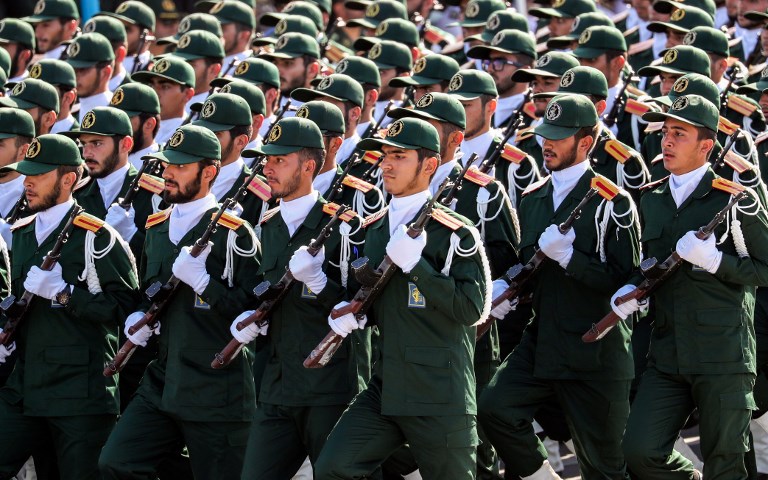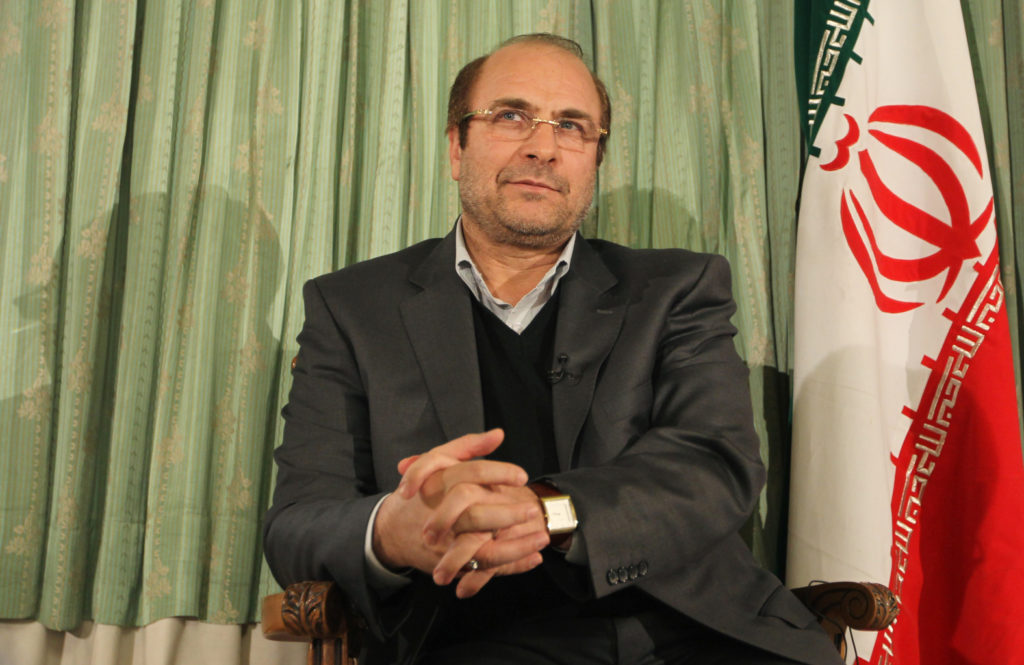Australia/Israel Review
The IRGC is taking over Iran
Jul 31, 2020 | Ran Porat

Following Iranian parliamentary elections in February, analysts noted a power shift inside the regime. The so-called hardliner camp gained a decisive victory, winning more than 200 of the 290 seats in Iran’s parliament, the Majlis.
The historically low voter turnout of 42% (in Teheran only 25% of the eligible population voted) was clear evidence of the apathy of the Iranians in light of the rigged elections. After all, the ultra-conservative hard-line Council of Guardians had disqualified almost all reformist candidates from running. The result was a takeover of the legislative body by a conservative-hardliner coalition championed by the Supreme Leader Ayatollah Ali Khamenei, leaving the supposedly reformist President Hassan Rouhani isolated and powerless.
Khamenei had reportedly been worried that protests against the oppressive ruling regime would resume given the widespread impact of the coronavirus – Iran was recording more than 200 deaths per day in early July – and the rapidly deteriorating economy, crumbling under the biting US-led international sanctions designed to punish the regime for its nuclear and terror activities. By taking over the Majlis, the hardliners managed to suppress any final remnants of opposition, which were in any case very limited, that still existed there.
The change in the make-up of the Majlis is the latest step in Khamenei’s “Second Phase of the Islamic Revolution” grand strategy (presented in a speech in February 2019). The aim of this strategy is to ensure that the leadership of Iran “is entrusted to young, revolutionary, wise and competent young people.” Supposedly meant to preserve the revolutionary spirit in the style of the founder of the Islamic Republic Ayatollah Ruhollah Khomeini, this program is in fact an ideological umbrella for a campaign to promote “securocrats” – senior officials affiliated with Iran’s radical Islamic Revolutionary Guard Corps (IRGC) – into leadership positions across all branches of the Government.
Qalibaf: Powerful, aggressive and corrupt

New IRGC-affiliated parliamentary Speaker Mohammad Baqer Qalibaf
Leading the IRGC “securocrats” in the Majlis is the new speaker, Mohammad Baqer Qalibaf. A trained pilot, he retired as an IRGC brigadier general after serving as the commander of the Khatami al-Anbia Construction Headquarters and of the IRGC’s Air Force (1994-2000). Qalibaf later served as national chief of police from 2000 to 2005, and as the first IRGC-affiliated mayor of Teheran from 2005 to 2017. He ran unsuccessfully for the presidency three times – in 2005, 2013 and 2017.
Qalibaf has been embroiled in several corruption scandals. In 2005 he was accused of assisting drug and fuel smugglers to obtain their release from prison in exchange for monetary donations to his presidential campaign. The investigations into this case were allegedly hushed up by the media and the judiciary.
In another case, Qalibaf and his entourage were suspected of distributing more than US$500 million worth of properties to friends in Teheran’s wealthy northern area. The reporter who published the accusations was arrested. Qalibaf also escaped investigation into his possible role in financial corruption concerning two banks operating under the aegis of the Teheran Municipality, as well as for supposedly awarding 600 billion rials (A$20.5 million) to his wife’s charity (the Imam Reza Charity Institute), while his son was also mentioned in relation to another corruption matter.
His reputation as an oppressor of dissidents is just as notorious. In 1994 he founded the intelligence body of the Basij, the IRGC’s civil volunteer organisation in charge of crushing domestic opposition to the regime. He was personally involved in suppressing anti-government protests on numerous occasions.
His power emanates from his close ties to a network of the most influential people in the regime, most importantly the Supreme Leader Ayatollah Khamenei. Another of Qalibaf’s allies is Ebrahim Raisi, the extreme hardliner infamous for his central role in the mass executions of thousands in the late 1980s. In line with the ‘Second Phase’ strategy, Raisi was appointed by Khamenei as Iran’s Chief Justice in March 2019. Raisi has close ties with the IRGC from his time as chairman of the wealthy and influential Astan Quds Razavi fund.
Qalibaf has promoted close allies to key positions, including the second vice-speaker, Ali Nikzad, formerly the manager of Raisi’s presidential campaign. Currently, former IRGC or Basij members constitute a majority (seven out of 12 members) among the Parliament’s presidium (a committee in charge of running the Parliament, membership in the presidium is for one year), while at least 16 prominent Majlis members who are in charge of committees or in other positions of power in the Parliament are also IRGC-linked.
Qalibaf’s newly-appointed advisor on strategic affairs, Mahdi Mohammadi, also fits in with the “securocrats” despite not being an IRGC representative, given his background as the most radical member of Iran’s negotiating team for the 2015 nuclear deal (JCPOA), and his staunch anti-Western views.
Similarly, the Supreme Economic Coordination Council, and the Supreme National Security Council (SNSC), each contain a number of former and current senior IRGC commanders, including Qalibaf and Raisi. These councils have the power to circumvent and nullify parliamentary decisions (and have done so in the past). Signalling more limitations on the Majlis, the 93-year-old Secretary of the Council of Guardians, Ayatollah Ahmad Jannati, told the Parliament on July 21 that he wants the council to have the authority to remove MPs and to oversee law drafting from earlier stages.
The next target – the presidency
First on the agenda of the IRGC “securocrats” is limiting the power of Qalibaf’s archnemesis President Rouhani and his allies, who are wrongly labelled “moderates”.
A letter issued in late June by the heads of nine Majlis committees, together with the spokesperson of the Parliament’s presidium Ahmad Amirabadi Farahani, another IRGC veteran, called on Rouhani to change his economic policies, reminding him that the Majlis is “revolutionary in nature” and warning him that they “will not remain silent when people’s rights are compromised.” A few weeks later, 130 MPs tabled a motion to impeach Rouhani due to his failures to manage the economy, the pandemic and foreign policy.
In a rare appearance in the Parliament via videolink on July 12, Ayatollah Khamenei made it clear he would not allow the impeachment of Rouhani. After all, he needs the transition of the presidency to his “securocrats” to appear legitimate. In any case, presidential elections, scheduled for mid-2021, are looming and Rouhani will not be eligible to run again after two terms. His position is therefore up for grabs by an IRGC “securocrat” very soon.
It is unclear if Qalibaf will run again, after failing three times. Raisi lost in 2017 and is now tipped to be one of the leading candidates to replace the Supreme Leader in due course. The hardline former president Mahmoud Ahmadinejad, a Basij graduate, is testing the waters to see if he could run again, but he has fallen from grace in the eyes of Khamenei.
Into the fray of possible candidates enters another IRGC “securocrat”, Parviz Fattah, although the hardline ideologue and experienced politician has denied in the past that he is considering running for president. An order from Khamenei to contest the presidency will change everything. Considered popular among the radical elements inside the already extremist IRGC, he is the current head of the Bonyad e-Mostazafan Foundation – an organisation directly involved in the acquisition of materials and equipment for Iran’s nuclear and missile weapons programs. Fattah is on both the US and European Union sanctions lists due to his role in illegal nuclear-related smuggling efforts.
Radicalising foreign policy
The IRGC ”securocrats” are also working to protect their flagship projects – the nuclear weapons program and the long-range missiles project to carry the atomic warheads to their destination. They see the JCPOA, negotiated by Rouhani and his Foreign Minister Javad Zarif, as an evil mechanism slowing down advancement in both projects and reject any compromise with the US, which withdrew from the deal in May 2018.
Addressing the Parliament on June 21, Qalibaf starkly warned that negotiating with the US “is strictly forbidden and detrimental” and concluded that the West, including the European partners of the JCPOA, have “once again proved their untrustworthy and hostile nature to the Iranian nation.”
Qalibaf’s speech was the first of several rounds of loud personal attacks against Rouhani and his people, including a motion tabled in July by 200 MPs questioning his foreign policy, specifically with regards to the JCPOA. Fending off such an attack in early July, Foreign Minister Zarif resorted to claiming that his foreign policy moves and the JCPOA negotiations were coordinated with Khamenei and with arch-terrorist Qassem Soleimani, the Commander of the IRGC’s Quds Force killed by the US in January. “The US does not recognise liberals, reformists, conservatives, revolutionaries and non-revolutionaries. We are sitting in this boat all together,” Zarif said.
Facing increased criticism from the International Atomic Energy Agency (IAEA) for its failure to comply with the nuclear watchdog and allow access for inspectors, the Iranian Parliament’s National Security and Foreign Policy Commission on June 23 called on the Government to limit the IAEA’s capacity to monitor Iran’s nuclear activities by stopping the implementation of Additional Protocol (which grants the IAEA extended monitoring capabilities in Iran) and, somewhat unclearly, “change inspections into offline.”
If taken, such a step would constitute a very serious breach of Teheran’s international obligations and likely substantially undermine the IAEA’s ability to effectively monitor Iran’s nuclear activities.
IRGC tax-free money channels
One crucial issue on the agenda of the IRGC “securocrats” is safeguarding the flow of funding to the IRGC. The IRGC’s share of Iran’s 2020-2021 budget, unveiled in June, reached record highs. Despite the dwindling coffers in Teheran because of sanctions, coronavirus and years of corruption and mismanagement, the IRGC was awarded US$6.96 billion (A$9.78 billion), 34% of the entire defence budget. The Artesh, Iran’s larger conventional military (with more than 420,000 personnel as opposed to 190,000 in the IRGC), only received US$2.73 billion (A$3.78 billion).
The IRGC also has revenue raising ventures outside the formal national budget. Nader Uskowi, an Iran expert at the Atlantic Council’s Scowcroft Center for Strategy and Security, has estimated that the various mega-sized foundations, funds and companies controlled by the IRGC and the Supreme Leader combined constitute about half of Iran’s economy. The IRGC-related financial network extends into almost every aspect of supply, production and services in the country. This includes agriculture and food, banking and investments, infrastructure, mining and construction, media and telecommunications, transportation, education and more.
The huge business enterprises controlled by the IRGC funds and foundations are tax-free and are not recorded in Iran’s official government budgets. Hence they are not subject to oversight by either the Parliament or the public. The IRGC benefits from having its “securocrats” and veterans control the Government and the Parliament to ensure no scrutiny is applied to their vast economic empire. With so much money in the IRGC system largely without oversight or transparency, it is no wonder there is extensive corruption, especially given Iran’s ailing economy more generally.
In 2021, the IRGC “securocrats” are poised to complete their takeover of all branches of Iran’s Government, increase their control over the economy, and continue relentlessly funding and driving their weapons of mass destruction programs and terror proxies across the Middle East.






